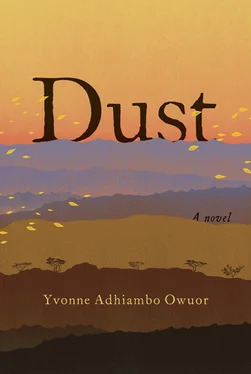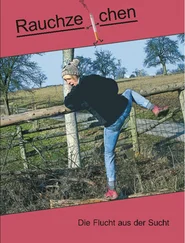“Going home,” Petrus had explained to the man.
“Dala!” The man had grinned when he was lifted into the vehicle. “Bye-bye.”
Petrus had waited for three days before presenting the letters of release to the state dungeon keepers and suggested that the highest authorities were waiting for Aggrey Nyipir Oganda. In less than an hour, Nyipir had been hustled into a hired car. Petrus drove off, speeding out of Nairobi.
Petrus stabs at his eyes to explain to himself to Nyipir: “My loyalty was always under judgment.”
His name, Keah, derived by his father from the acronym for the King’s African Rifles — KAR — blurred access to place of origin. Petrus was hard to place. There were Keahs of every Kenyan ethnicity. Petrus had been born in Nairobi. In the blood-hunt season of 1969, “Tribe Unknown” was a lucky thing to be. But Nyipir had been handed over to him as a temptation and an exam.
Petrus studies his shoes. “Bad times, Oganda. Had to toughen you up. A chance to live.” By the time I am through with you, you’ll become another. You’ll become mad and strong. You will live .
Nyipir asks, “Why me, Keah?”
“A picture.”
“A picture.”
“Inside your file. A photo of you carrying the Kenyan flag on a black horse.”
Nyipir frowns.
Petrus continues: “You and the horse are— were —my Kenya.”
Nyipir wrestles a tidal flow of memory, his first contact with Petrus in the interrogation rooms. Petrus had made it a boxing match.
“Cowards run from hard touch.” Petrus fists had been up. “Am I your enemy? When confronting an enemy, truth is in the fight. Blood must be spilled. Hands up!”
A blow had fractured Nyipir’s jaw.
He had fallen.
“Get up!” Petrus had screamed.
“Read your enemy’s eyes. Truth sets free.” A blow to Nyipir’s solar plexus. Nyipir had tumbled to the ground, gasping.
“Pay attention! Up!”
Nyipir, blinded, had got to his knees; scrambling about and with indifference, had thrown a punch that landed just above Petrus’s boot.
Petrus had laughed. “A bull is wounded a little to give its killer advantage, but sometimes even the bull can win.” He had helped Nyipir up and tried to whisper a message: “Take the oath. Go home to Akai, your wife.”
Nyipir remembers how the blood from his head had blinded him, the soft swollenness of his head. “Aloys,” he had spat.
Petrus, who had not heard of Aloys Kamau, had snarled, “Why sing the songs of those who can’t even say your name?”
“I brought you home,” Petrus now whispers.
Petrus had driven Nyipir as close to Kalacha Goda as possible. Maikona. Petrus dragged a catatonic Nyipir out of the car and said, “Live. Forget.” He would not see Nyipir again until the day in late 2006 when Nyipir came to beg him to find Odidi and save his life.
Doum palms rattle in Wuoth Ogik. Inside the house, a split tank groans, and the back wall breaks. Outside, Nyipir’s voice is amused. “Now I should thank you, Keah?”
“Yes.”
“No.” Nyipir pokes at the ground. He says, “History professor. Married to Nadezhda Grigorieva. His name, Ochieng Andronico, wuod Seme.”
Petrus shivers, “Who?”
“The code tapper. He had a name.”
Drifting white streaks cover the sky above.
Then, “I see. The boy?”
Nyipir stares at Petrus before pointing at Odidi’s cairn, “He’s there.”

They all stand around Odidi’s cairn. Petrus embarks on an extravagant prayer: “ Ah! Obongo Ruoth Nyasaye Nyakalaga, wuon polo kod piny, Nyasach oganda ”—O great, omnipresent, and omnipotent Governor of the heavens and earth, God of humanity … Petrus does not finish. He is whimpering. The sound releases what has been blocked within Nyipir.
The weight and curse of holding Kenya up for his children, his fear of Akai’s fears. His questions converge in a howl that twists his body. But before Nyipir can disintegrate, Petrus gathers him up. He holds Nyipir. A trick of light makes Petrus’s tears look like blood, which stains Nyipir’s collar.
Ajany sobs dry tears, clutching her body. She spins away, racing to exhaust herself. Galgalu scuffs his feet. Tears are rain. They water soil. Restore life . Galgalu thinks he will light the lanterns early today.
The next morning, Petrus Keah leaves, with Galgalu as his guide, to go to the American mission. He leaves with Ajany’s old AK-47.
NYIPIR IS USING STONES AND STICKS TO SHOW AJANY HOW, IN 1956, the year Kenya competed in the Olympics for the first time, he laid out Hugh Bolton’s forks, knives, and spoons. “The government got tired of him, and he was annoyed with them. He said they were selling Kenya to murderers. He shouted at them until the day he was told to plan for security north of the Ewaso Nyiro River, in the Northern Frontier District.”
“They expect me to refuse and resign, boy,” Hugh had told Nyipir, “but I shan’t, the buggers.”
Nyipir remembers.
“Our lorry fell into a gully near Marigat. Did Bwana Bolton say, ‘Go back’?” No. He said, ‘We walk,’ so we walked.”
“You walked?” she asks her father.
“A long, long time.”
Ajany sketches Hugh Bolton, trying to find Akai-ma in what Nyipir does not say.
Nyipir speaks of counting every twenty-third shilling he earned each month as servant and serviceman: “Money for Burma.”
She glances at Baba, hand propping her chin.
“Burma,” Nyipir repeats, seeing again a cold long-ago night when, mid-sleep, he heard a lake moaning for its mother, the Nile. All those years ago, he and Hugh had flailed through seven walls of heat, seen mirages for four days. Like every other outsider, Nyipir had been tempted by and tasted Anam Ka’alakol’s waters. Lake Rudolf. Hugh had kicked small stones and sand into the water after he had spat out the soapy, brackish water. They had made camp there, exhausted.
A pause. “I told Baba and Theo, I’m coming to Burma for you .”
Nyipir had also told Anam Ka’alakol, the immense lake, that he would take her message of longing to the Nile, and promised to return with an answer.
Nyipir shuffles off toward Hugh Bolton’s cairn.
He had gone neither to Burma nor to the Nile. He reads the dry land. He had walked past brown-and-gray elongated, treeless, desiccated, moonscape, mudflats, sweltering, you-are-not-a-man-until-you-have-crossed Suguta Valley. It had been greener then. Animals everywhere. Elephants. But he had gone neither to Burma nor to the Nile.
Nyipir leans over Hugh’s cairn. Remembers how, in their wanderings, they had found a man lying on a stone grave who neither spoke nor responded to Hugh’s haranguing in bad Kiswahili, “Kijana utasimama sasa hivi ni nini unafanyikana hapa?” What exactly is happening here?
Later, through a Somali trader, by way of gestured conversation, they heard that the grave hosted the man’s Didinga wife.
They had bartered dried meat for a knife.
Steel plate for water and fermented milk.
In the evening, while setting out the service for Hugh’s bush dinner, Nyipir saw Hugh painting the story of a man and his buried wife.
They would hunt antelopes, dik-diks, gerenuk, and oryx for food. Hugh found Abyssinian iconography and thought he had invented it. He wrote out their journey — places, facts, figures — and drew shapes on a rolled-up sheet, counted cairns, and noted a heading in his red notebook, Vitu vishenzi . Vile Things. These included wolf spiders, unmade camp beds, lukewarm tea, a raging bull elephant, Hugh’s broken toe-nail, and his swelling foot — and Nyipir’s applying too hot a compress to that foot. “Umefanya kitu kishenzi!” bellowed Hugh.
Читать дальше












